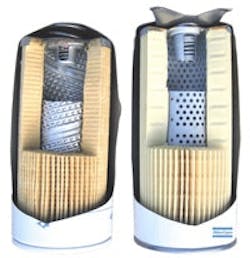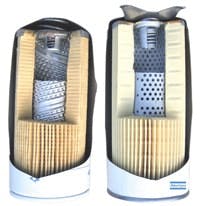Factory parts quality-ensured for durability, efficiency, and performance
Some vendors extend the definition of counterfeit parts to include aftermarket and other components, especially when those are substituted for factory parts without the knowledge and consent of the equipment owner.
“It’s relatively easy to find counterfeit parts. Generally, counterfeit (non-genuine) parts look like the original parts, but don’t have the same quality as genuine Atlas Copco parts.” says Alessandro Fantacone, aftermarket product manager, Atlas Copco Airpower — Belgium (www.atlascopco.com). “They’re cheaper, and as consequence they have lower quality. Non-genuine parts suppliers target high-volume consumables — oil and air filters, and lubricants.”
Like many manufacturers of specialized, heavy-duty industrial equipment, Atlas Copco takes significant pains to ensure the quality of consumables because they affect equipment durability, efficiency and performance.
Sectioning a typical non-genuine and a genuine Atlas Copco oil filter shows where the wrong seal material or size can cause oil leaks, a bypass valve with the wrong setting can starve a compressor's airend of lubrication, and filter media tensile strength, chemical compatibility, micron (Beta) rating, and pleating affect performance. In severe cases Atlas Copco has seen non-genuine media disintegrate because of chemical incompatibility restrict oil flow enough to cause airend damage or failure
“When developing a new machine we have a very strict procedure where we qualify parts in several stages, performing extensive tests to see how they,re operating and performing,” says Fantacone. “We work with high-quality suppliers and collaborate in the design of key components. If our replacement parts aren’t used, we can’t assure that the machine will function as originally designed.”
Non-factory lubricants and air filters also come with risks. “There’s a direct link from oil quality to machine life. Non-standard oil can lead to higher water content and lower bearing life,” Fantacone says. “We work to minimize energy consumption. Most counterfeit air filters have higher pressure drops than genuine Atlas Copco air filters. These higher air filter pressure drops increase energy consumption and nearly always cost more in electricity than saved by purchasing a non-genuine part.”
Non-factory parts may appear to be a good purchase, but may lead to some hidden costs such as higher maintenance and operating costs due to shorter lives and higher energy consumption.
“If a service organization is offering you a non-Atlas Copco part, it’s because the service organization is interested in making higher profits,” Fantacone adds. “They may sell it at 80% of the price of the Atlas Copco part but they pay much less for it, and the reason is simple: performance and quality are much lower.”
Fantacone suggests you take these steps to guard against inadvertently using non-original parts:
- Always ask for genuine parts.
- Make sure your service provider is using factory parts. Look at the manufacturer’s Web site to see the part and the box, and look at what is going into your machine.
- Check the billing or receiving paperwork against the manual to see that the part numbers match.
- If you see a big price difference or if suddenly the part is half the price, it’s probably not a factory part, and will lead to higher lifecycle costs.
- Remember that machine downtime is a huge cost.

